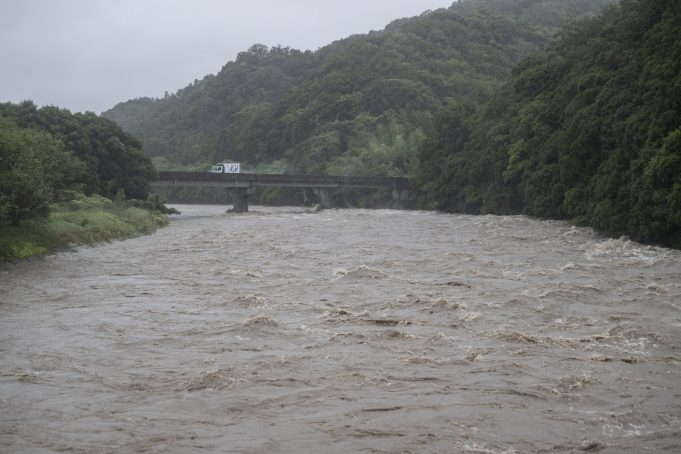FUKUOKA – Typhoon Shanshan hit Japan with full force on Thursday, injuring dozens as howling winds smashed windows and blew tiles off houses while torrential rains turned rivers into raging torrents.
Rains driven by the approaching typhoon led to a landslide that killed three people earlier in the week.
The coastal city of Miyazaki, littered with debris from buildings, reported 26 injuries — including some from a tornado — with 156 incidents of damage to buildings, a disaster official told AFP.
Broadcaster NHK put the number of injuries at 39 with one person missing.
Most of the injuries were caused by strong winds smashing windows, with none life-threatening. Broadcaster NHK reported that nine people were hurt in nearby Kagoshima.
AFP reporters saw a river on Kyushu flowing ferociously with muddy water.
Student Aoi Nishimoto, 18, said he had called his family in Miyazaki.
“Our home is fine, but there was a tornado in Miyazaki and power went out in some places. It’s worrying,” he told AFP in Kyushu’s main city Fukuoka.
“This year, I am away from my parents’ home for the first time. So it’s a bit scary being all alone,” fellow student Rio Ohtsuru, 19, told AFP.
“Maybe I will look for a flashlight in case of a power outage,” she said.
Kyushu’s utility operator said that 254,610 houses were already without power elsewhere on the island.
The system was moving slowly, which often means more rain, with the weather office forecasting it would gradually rumble towards Japan’s main island Honshu and the cities of Osaka and Nagoya, although this could change.
The Japan Meteorological Office warned that “the risk of a disaster due to heavy rain can rapidly escalate in western Japan as Friday approaches”.
For Kagoshima, the JMA issued “special warnings of violent storms, high waves and high tides”.
“Please exercise maximum vigilance against violent storms, high waves and high tides in Kagoshima, as well as landslides, flooding in low-lying areas and overflowing rivers in southern Kyushu,” it said.
For southern Kyushu, the JMA predicted an enormous 1,100 millimetres (43 inches) of precipitation in the 48 hours to Friday morning.
Heavy rain brought by Shanshan has been lashing large parts of Japan since Tuesday.
Three members of a family died after a landslide buried a house in Gamagori, a city in central Aichi prefecture, late Tuesday, local media reported.
The deceased included a couple in their 70s as well as a son in his 30s, while two adult daughters in their 40s survived with injuries, Kyodo News reported.
Auto giant Toyota has suspended production at all 14 of its factories in Japan. Nissan and Honda also decided to halt operations at their Kyushu plants, reports said.
Japan Airlines and ANA cancelled 542 domestic flights between them for Thursday and Friday, affecting 39,100 passengers.
Kyushu Railway suspended shinkansen bullet trains on the island while Central Japan Railway said services would be disrupted elsewhere on Friday.
Shanshan comes in the wake of Typhoon Ampil, which disrupted hundreds of flights and trains this month.
Despite dumping heavy rain, it caused only minor injuries and damage.
Ampil came days after Tropical Storm Maria brought record rains to northern areas.
Typhoons in the region have been forming closer to coastlines, intensifying more rapidly and lasting longer over land due to climate change, according to a study released last month. – AFP

















